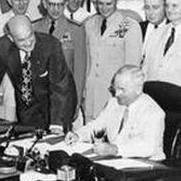A significant anniversary passed on Oct. 31 that received little attention -- the passage of the National Security Act of 1947. Sixty years ago last month, in the aftermath of a catastrophic global war, the United States reorganized its instruments of statecraft for the developing Cold War with the Soviet Union -- a war that the newly created instruments eventually helped in winning. The National Security Act of 1947 created the Department of Defense, the National Security Council, and the Central Intelligence Agency. At a time of profound change in the international system, President Truman and his advisors recognized that meeting future threats required truly original thinking and an honest recognition that the old system -- characterized by a tiny military and a distinctly modest foreign policy -- was no longer adequate for America's new global role. The Department of Defense gave a home to previously separate Departments of the Army and Navy, along with a newly created Air Force. The department was given a Secretary of Defense and a Joint Chiefs of Staff charged with providing military advice to the president. The Central Intelligence Agency put America's spies under centralized direction, and the National Security Council ensured that the president had both a personal staff of professional national security practitioners, and a forum for hearing all sides of critical strategic issues. These organizations are today known to all Americans, immortalized in history and as dramatic vehicles in American film and television.
Sixty Years After the National Security Act, U.S. Statecraft May Need Another Reorganization

